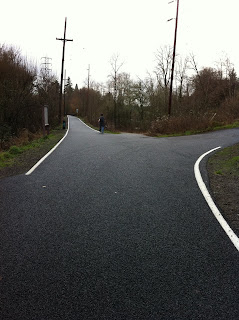Never Done: Got a ride on a cargo bike
Everyone kept talking about the food carts, and I was all, yeah, I know about the food carts -- there's nothing new about the food carts, and they were all, the food trucks are the Big New Thing, you have to go to the food carts, and I was all, the food carts have been there forever, and they were all, here's an article in the Willamette Week about the food carts, and eventually, because even if I am dense and slow sometimes I do actually pay attention, and I remembered the mide of Humility: Seek wisdom from everyone, so eventually I thought to myself, maybe they know something I don't know. So then I learned that the food carts I remembered are still there, downtown, but that now that are dozens more, all over town, in tons of different neighborhoods. If you are interested, here is a link to read about them.
So then I set out to go to a food cart, and it turned out to be a little harder than I thought it would be. Carol and Amy and Josh and I tried to go to one in Sellwood, but some were closed for the New Year's Holiday, and one was closed when we were there, at noon, but was open an hour later when we had already eaten elsewhere. Then I tried to go to the one on Hawthorne where there are apparently really good potatoes, but my timing was off, and I couldn't make it there. Eventually, Josh and I went to the pod on Mississippi, because it was on the way to my exciting date with Kronda and her cargo bike, even though I didn't want to go back to Mississippi (see my post from the day before yesterday.) And there we found a pod of carts, mostly closed, two open: a vegan place called The Ruby Dragon, and Garden State: Italian street food from the Willamette Valley. I went for the chickpea patty sandwich with delicata squash, carrot and radish slaw, and lemon aioli from Garden State. Damn it was good. And damn it was cold. The temperature had dropped to just about freezing by the time we got there, so it was just me, Josh, a big empty tent, and a superb sandwich. As soon as we finished, we hurried off to turn on the car heater and warm up our fingers.
And head to meet Kronda, who had promised me a ride on her cargo bike. Kronda has a lot of bikes. I forget how many now -- four I think. Maybe more. She commutes on her bike, and she jumps over logs on wet trails on her bike, she rides for days on her bike, and she goes camping with her bike. (Kronda has great muscles.) And when she heard about my Never Done project, she offered to take me for a ride on her cargo bike. Yay! It turns out to be really different to ride on the back of a friend's bicycle than a friend's motorcycle. I mean, she's doing all the work, and I'm sitting there, feeling vaguely guilty but actually having a wonderful time. When I told her this, Kronda said there was no vague guilt allowed -- so I put that aside, and just enjoyed being cargo. She rode me along Willamette Boulevard, which overlooks industrial Portland, and over the river to Forest Park (where I had just walked that morning, with the most wonderful Iowan, Bill Welch.) People smiled at us as we went by, and I waved, as we passed in slo-mo. I got to see the world at the pace of a bike, which is a pace I love, and one of the reasons I love to ride a bike, but I could look anywhere I wanted and take my hands off the handles. Maybe the closest I've ever come to this was being pulled in a little red wagon when I was a kid. Only different. Hard to explain, but it is complex to be transported by another driver on an outdoor, slow-moving, human-powered vehicle. I've never taken a pedi-cab, because it feels too uncomfortable to pay someone to pedal me around. But I found riding behind Kronda completely delightful -- I think because I have such a long, trusting, two-way, reciprocal relationship with Kronda. And also because Kronda is an enthusiast, about bikes for sure, but also about her life in general, and I knew she was taking as much pleasure in sharing a new experience with me as I was in sharing it with her. I just love people like that, and aspire to be more that way myself. Maybe that will be my resolution for this goyish New Year.





